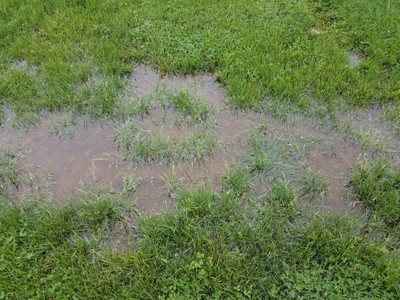
Walking out the front door first thing in the morning to discover your yard flooded is a disheartening experience. If the underground water line that connects to your home somehow bursts or springs a leak, you’ve got a serious problem.
Just what causes a water line break? At Punctual Plumber Dallas, we’ve noticed there are a few different causes connected to underground and exposed pipes. We cover the common reasons your water line might break and what you should do when it happens.
Corrosion

Underground pipes are subject to a variety of soil conditions. Conductive soil corrodes metal pipes. When this corrosion weakens the line to a certain point and your water line breaks outside your house, you may notice water pooling up in your yard.
All plumbing materials have a life expectancy. Your pipes require periodic maintenance and replacement. For external pipes, keep an eye out for excessive rust and corrosion. If you can head it off early, you may prevent a broken pipe. Have regular plumbing inspections and watch for signs of a leak:
- Dirt in water line
- Discolored water
- Lower water pressure
- Higher water bills
- Pooled water in yard
Freezing
Freezing weather can cause your water line to break. The fluctuation of temperatures, even in the Dallas Fort Worth area, cause swelling and shrinking of pipes that can lead to cracks. Small cracks lead to big breaks and eventually your pipe is fully compromised. It’s difficult to avoid this all the time with underground pipes, but you can wrap insulation around exposed pipes to prevent this.
Soil Conditions
Aside from conductivity, the overall condition of the soil for underground pipes can affect your pipes’ integrity. Pressure, movement, and tree roots can weaken a pipe over time.
As the ground shifts, pressure on underground pipes can increase or decrease. This shifting may cause your pipes to weaken or eventually leak.
Tree roots are attracted to the moisture inside your pipes. Tiny root tendrils seek out cracks and joints to enter. As they grow, they expand and put more pressure on underground pipes, weakening them. This can also be a problem in your sewer line.
Clogs

Even though your water line transports fresh, clear water into your home, it’s still possible to clog. If rust and corrosion build up over time, the pressure will increase as new water struggles to pass through. Eventually your pipe will crack under pressure. Tree roots can also create or accelerate water line clogs.
Human Fault
Pipes that weren’t properly installed to begin with are likely to leak sooner. Local construction or landscaping can also cause pressure changes and vibrations that weaken underground pipes.
Water Line Breaks in House
Water lines can also break inside or beneath your home for many of the reasons noted above. An interior break can cause significant damage if not repaired immediately.
An underground leak or slab leak can slowly seep through your home’s foundation and not only cause damage but pose health risks. If you notice dampness in your basement floor, contact a plumbing expert to have it checked.
How to Fix a Main Water Line Break
There are many reasons your water line might break. Once it happens, it doesn’t matter why as much as how you’re going to fix it. The technicians at Ben Franklin are experienced in several repair methods including trenchless line replacement.
Call or contact the Ben Franklin office near you for fast and professional relief from pipe breaks and other serious plumbing problems.




